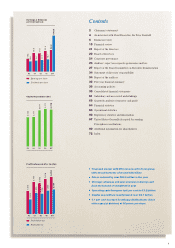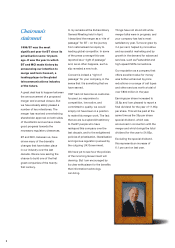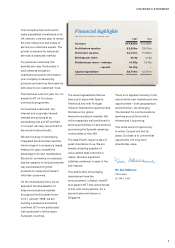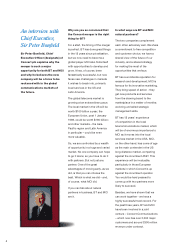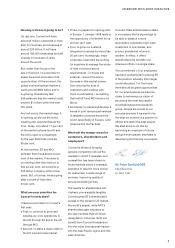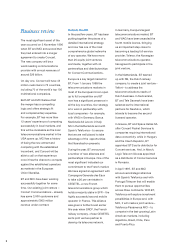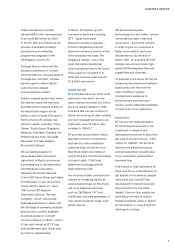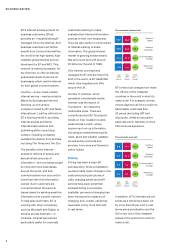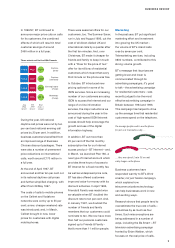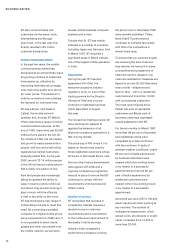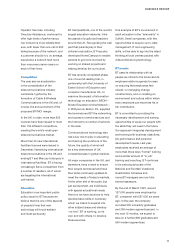BT 1997 Annual Report Download - page 9
Download and view the complete annual report
Please find page 9 of the 1997 BT annual report below. You can navigate through the pages in the report by either clicking on the pages listed below, or by using the keyword search tool below to find specific information within the annual report.
Three minute call to the USA/Canada
Daytime
(peak)
4
176.0 60.3 –79.9
Daytime
(standard)
4
167.2 60.3 –78.9
Evening/nights
(cheap)
4
140.8 57.3 –76.2
Weekends
(cheap)
4
140.8 53.3 –77.9
Aug Feb Real
1984 1997 terms %
(pence) (pence) change
BUSINESS REVIEW
9
In 1996/97, BT continued to
announce major price cuts on calls
for its customers, the combined
effects of which will result in total
customer savings of around
£460 million in a full year.
During the year, UK national
daytime call prices were cut by ten
per cent and national evening call
prices by 20 per cent. In addition,
business customers benefited from
an improved range of Business
Choices discount packages. There
were also a number of permanent
price reductions on international
calls, worth around £170 million in
a full year.
At the end of April 1997, BT
announced another ten per cent cut
in its national daytime call prices
and further simplified charging, with
effect from 29 May 1997.
The costs of calls to mobile phones
on the Cellnet and Vodafone
networks were cut by up to 55 per
cent; a new, cheaper weekend rate
was introduced; and, in March,
Cellnet brought in new, lower
prices for customers with digital
mobile phones.
There were seasonal offers for our
customers, too. The Summer Saver,
run in July and August 1996, cut the
cost of all direct-dialled UK and
international calls by a quarter after
the first ten minutes. And, over
Christmas, BT made it cheaper for
friends and family to keep in touch
with a “three for the price of two”
offer for its millions of residential
customers which meant that every
third minute on the phone was free.
In October, BT introduced new
pricing options for some of its
ISDN services. Since an increasing
number of our customers are using
ISDN to access the Internet and our
range of on-line information
services, the major reductions we
announced during the year in the
cost of high-speed ISDN Internet
access should help encourage the
growth and use of the digital
information highway.
In addition, BT cut more than
20 per cent off the flat monthly
subscription fee for our Internet
access product – BT Internet – and,
in March, we launched Plan 180, a
new type of Internet account which
provides three hours of access to
BT Internet for a fixed monthly fee.
As well as widespread price cuts,
BT has also offered customers
improved value-for-money with its
discount schemes. In April 1996,
Friends & Family was made twice
as valuable when BT doubled the
discount rate to ten per cent. And,
in January 1997, we doubled the
number of friends and family
members that our customers could
nominate to ten. We now have more
than half our personal customers
signed up to Friends & Family -
that’s more than 11 million people.
Marketing
In the past year, BT put significant
marketing effort and investment
into growing the UK market –
the volume of BT’s inland calls
rose by seven per cent.
Telemarketing services, including
0800 numbers, contributed to this
strong volume growth.
BT’s message that its prices are
getting lower and lower is
communicated through its
advertising campaigns. It’s good
to talk – the advertising campaign
for residential customers – was
recently judged to be the most
effective advertising campaign in
Britain between 1994 and 1996.
This campaign has helped to drive
up the average time that residential
customers spend on the telephone.
On average people used to use the phone
for just over 8 minutes a day . . .
...theynowspend1min35seconds
a day longer on the phone.
Business customers have
responded warmly to BT’s Work
smarter, not just harder campaign,
which explains how
telecommunications technology
can help businesses work in new
and exciting ways.
Research shows that people tend to
overestimate the true cost of calls –
sometimes by as much as four
times. Such misconceptions are
being addressed in a number of
ways, including the Be Smart – BT
television advertising campaign
fronted by Brian Walden, which
focuses on the real price of calls.

